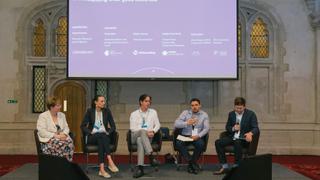On 21 – 29 June, the climate community came together for London Climate Action Week 2024. Here, Arc teamed up with the London Climate Innovation Forum to launch TransitionArc: a one-stop tool to assess corporate transitions to meet climate goals. The tool was showcased in the demo area throughout the day, and launched as part of a dedicated event to a packed room of climate action stakeholders – from financial institutions and policymakers to aligned collaborators in the climate finance ecosystem.
As the Arc team introduced the tool, the energy was palpable. The team explained the collaboration behind TransitionArc, the metrics, sectors and dimensions that it covers, and the use cases and opportunity for direct data exchange with financial institutions.
In two quick-fire panels, industry leaders and key TransitionArc partners shared their insights into the value of the tool, and ways in which we must work together towards common climate goals.

We need to equip that pension committee chair with those killer questions without them reading hundreds of pages of reports, so that they can challenge their asset managers. This moves us
all forward in terms of climate alignment.
Through the discussion, three key themes emerged:
1. Convergence is key.
In applying climate standards and reducing fragmentation in the market, the convergence and collaboration of those working in data, disclosure and transition frameworks is vital. IFRS recently announced a merger with TPT on disclosure work, for example; CDP aligned with IS2 and IFRS to increase the efficiency of corporate disclosure; NZDPU is working with many organizations, including IFRS, LSEG and CDP, and building an open data repository. This work can only be scaled through dynamic collaboration – regardless of where the information lives, it needs to be available and usable by actors across the ecosystem.
Companies are getting better at disclosure. They are learning from each other, and adapting and improving their methodologies - but they can only do this by enhancing data with analysis, so that decisions can be made in the real economy.
With a rapid shift from voluntary disclosure to compliance taking place, the climate action community must continue to converge, to ensure that transition plans are effective business plans, that financiers and corporates understand what a good transition looks like, and that they understand what the analysis is telling them by having comparable, transparent data sources in one place.

2. Empowerment is critical to drive action.
TransitionArc grades companies on a scale from A to E – yet there are tangible stories of transition in every letter. It’s not about a binary outcome of being ‘in’ or ‘out’ on climate action, but about how each goes through the journey to A. By improving the usability of different analysis, we can help empower those at different parts of the journey – by making assessments transparent, we can drive accountability forward.
We need to look at transition progress holistically and empower decision makers to do so too. If analysis is only going to be as good as corporates are reporting, we need to empower disclosure – raw data, to ensure that this becomes a virtuous circle where analysis and disclosure improve each other. By providing them with understandable, open-source data, we can empower them to engage.
What I love about TransitionArc – it’s about trust and transparency and getting decision-useful information into the hands of the right people.
Mardi McBrien, IFRS Foundation


Investors are looking for data, for sources of truth on climate. It can be like putting a puzzle together, but different puzzles and all with missing pieces... TransitionArc does this work for them.
3. To move as fast as we need to, we must move together.
There is no perfect set of metrics; the ecosystem is still working out how best to assess companies and countries. We can ask, “what are the perfect metrics that we need?”, but in five years’ time, the answer will look different to today. To move as fast as we need, “unholy alliances” are required. We need to look at different angles side by side, and different sources of information. What is the role of artificial intelligence, for example? What about accessing undisclosed information through satellite imagery? Technology and multi-dimensional collaboration will be critical.
TransitionArc is a unique collaboration between world-leading corporate climate data and analysis providers, including the Carbon Tracker Initiative, CDP, Corporate Knights, Global Canopy, InfluenceMap, the International Council on Clean Transportation, Science Based Targets Initiative, Transition Pathway Initiative and World Benchmarking Alliance.
The tool will continue to evolve and expand to increase its decision-usefulness for a range of stakeholders.


Since the launch at London Climate Action Week, a new partnership with the University of Oxford’s Environmental Change Institute and XDI (Cross Dependency Initiative) has been announced, the first on this journey of evolution. This partnership will consider how adaptation and physical risk analysis can be brought into the tool.
There is much work to be done, and many alliances still to be made, at Climate Arc and across the ecosystem. Alongside these new collaborations, we look forward to continuing dynamic collaboration with the partners and collaborators that have made it possible so far.





